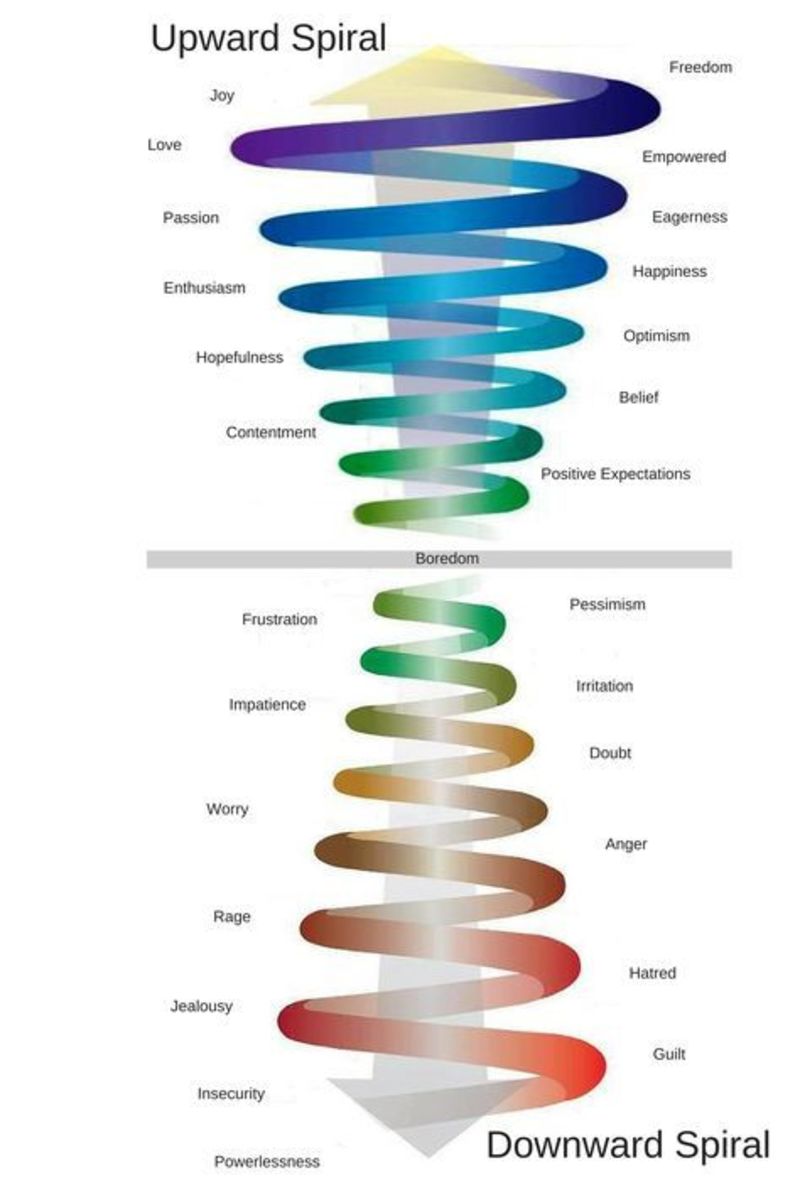Overcoming Chronic Procrastination – Part I: Why We Do It

Never put off till tomorrow what you can do the day after tomorrow.
- Mark Twain
I've been meaning to write this Hub for some time now, but I keep putting it off. :-)
But, I'm trying to subscribe more to the "just do it" philosophy of life, so here goes...
"Lazy." "Immature." "Selfish." "Whiners." "Undisciplined."
These hurtful labels are what we sling at those suffering from chronic procrastination, not realizing that the vast majority of "slackers" are decent people who want to be productive, but can't.
Everyone procrastinates to some degree, but chronic procrastination is much more than simple "laziness" or "immaturity." It's a complex condition with a variety of factors operating simultaneously to encase the sufferer in a rigid cocoon of habitual avoidance.
And I'm here to tell you, it really sucks. Wanting to engage, move forward, produce and participate without being able to is pure hell. And the scorn society heaps upon those who "aren't tough enough" to keep up just makes an already painful situation all the more unbearable.
- I just want to cry... I feel like I've really screwed up this time. I'm just so far behind.
Daewen - (26 yr old female) - I often tell myself to go do something NOW. And don't. And feel guilty after. And STILL don't.
LaDiva2708 - (18 yr old female) - I procrastinate even with things that don't matter.
Somberwald - (18 yr old male) - My life is such a mess. Everywhere I look there are things undone, half-done, or waiting to be started.
ME - (46 yr old male)
It's estimated that 20% of people in the United States suffer from chronic procrastination. Let's take a look at the main causes (why we do it). In Part II, we'll talk about some treatment options (what we can do about it).
********************************************************************************************************
Do you believe you suffer from chronic procrastination?

Causes of chronic procrastination
Self-conflicting beliefs and attitudes
One of the most common causes of chronic procrastination is the belief that all pleasure comes from leisure, from tasks that "lack responsibility," while simultaneously believing one should produce and achieve at the highest possible level.
This leads to an inefficient system of productivity and is a breeding ground for feelings of self-loathing, inadequacy, and choice paralysis.
Chronic procrastinators experience these feelings on a daily basis.
Too many choices
In an increasingly complex and technologically driven society, the sheer number of choices we must make everyday is staggering. Even trivial choices, like what kind of ketchup to buy, still draw upon our reserves of psychic energy. I counted 16 different kinds of ketchup at the store the other day! I ended up not getting ketchup at all because I couldn't decide which one to choose.
And then there are more significant "life choices" to contend with: when to get married, when to have kids, what career to choose, if and where to go to school, etc. Plus, careers are now narrowly focused and highly specialized.
Career choices alone can be paralyzing
For example, take my career, which is Information Technology. Here are some of the career specialization choices now available in the IT industry. If you don't know what some of these mean, that's OK. A lot of people in IT don't know what they are either.Which of these would you rather be?
Software engineer
| Computer programmer
| Systems administrator
|
Information systems manager
| Business intelligence analyst (an oxymoron if there ever was one)
| Clinical data manager
|
Computer network architect
| User support specialist
| Data warehousing specialist
|
Database architect
| Document management specialist
| Infomatic nurse specialist
|
Video game designer
| Search marketing strategist
| Information security analyst
|
Web developer
| Web administrator
| Operations resource analyst
|

Faced with so many options, from ketchup to career paths, psychological studies have shown that:
- People increasingly tend to have "choice paralysis." They just can't make up their minds. In some ways, life really was simpler before the industrial revolution because there were a lot fewer choices to make. Only recently has our social and technological innovation outstripped our biological capacity for making decisions.
- People tend to make poorer choices. Overwhelmed by all the choices available to them, people have a tendency to choose things that are immediately gratifying over things that provide long-term satisfaction.
- People learn that choosing is "bad." Because overwhelmed, stressed out people often don't make good choices, they develop an unconscious attitude that choosing leads to negative outcomes, and is therefore something to be avoided. And what is chronic procrastination except the anxiety about making the "wrong" choice? Safer to just make no choice at all.
Evolutionary adaptation
Part of peoples' increasing tendency to procrastinate can be linked to the evolution of the human species. Until quite recently (in evolutionary terms), most human energy was expended toward immediate, short-term goals of survival and directed AWAY from long-term planning and delayed gratification.
Before the advent of industrialized technology, humans had less control over their environment and were more susceptible to the contingent whims of the natural world - i.e., starvation, natural disasters, weather conditions, crop failures, attacks from wild animals, etc.
Short-term thinking was what mattered most, and planning was limited to solving the "right now" problems of day-to-day survival. What we now call "impulsive" behavior (the tendency to make choices resulting in immediate gratification) has been, for most of human history, an adaptive survival mechanism.
Today, we lack the pressure of immediate survival most of the time. The forces that motivate our behavior are more abstract. But our evolutionary makeup is still geared toward short-term decision making. The abstract motivations of modern life are often not powerful enough to overcome the avoidance of tasks that don't result in short-term reward.
Modern decision making (like choosing a career) frequently requires tolerating boredom and uncertainty in pursuit of some hoped-for future reward. This is another example of our technology outpacing our evolutionary capacity as a species.

Physical illness
Sometimes the cause of chronic procrastination is very straightforward: people put things off because they're sick. And "being sick" can include a wide range of conditions like:
- Major, life-threatening illnesses. Cancer, heart disease, MS, Parkinson's, etc. People facing this kind of sickness are fairly likely to put off everything but the absolute essentials necessary for survival.
- Ongoing, debilitating and painful conditions. These illnesses aren't immediately fatal, but are ongoing drains of physical and psychic energy. This includes diabetes, rheumatoid arthritis, Lupus, Irritable Bowel Syndrome, Fibromyalgia, sleep-deprivation and a whole range of auto-immune disorders.
Even if your life is not in immediate danger from these or similar conditions, there's something about being in constant pain that makes chronic procrastination seem almost inevitable. It's very hard to make abstract, long-term choices when you're hurting.- Overwhelm, exhaustion, and burnout. Although not technically a "disease" in the common sense of the word, being overwhelmed with too many responsibilities and / or burned out in your job takes a physical toll and exhausts your energy resources. Chronic fatigue and adrenal exhaustion are two common manifestations of this.
Not procrastinating (i.e., making decisions and following through with action) takes physical energy, and lots of people simply can't do it because they're too tired and stressed out.
Does procrastination significantly harm your physical or psychological health?
- Procrastination and Anxiety Disorder – 5 Simple Ways to Do Something That Scares You
Procrastination: The bane of every anxiety disorder sufferer’s existence. Procrastination, oh how I hate you!

Mental health problems
People generally assume that chronic procrastinators ALWAYS have mental heath issues like depression or anxiety.
This is not necessarily true, although ongoing mental health disorders are a significant cause of procrastination. Below are the ones that are the most common contributors:
- Depression. It's hard for someone who's never experienced the despair, hopelessness, and sheer leaden weight of depression to really understand what it feels like. It's as if a psychic vampire has sucked away all your life force, leaving a husk of flesh resembling what used to be a human being.
Everyone gets the blues occasionally, but depression is a chronic condition that makes performing the simplest tasks seem impossible. I once had a woman tell me she would cry every time her husband left his socks on the floor because she knew they'd be there for weeks before she could summon the energy to pick them up.
The specific manifestations of depression that result in self-defeating procrastination include:
Lack of enthusiasm. People with innate enthusiasm and a sense of life purpose are less likely to procrastinate. One of the classic features of depression is the increasing inability to enjoy or care about anything. Life looks bleak and meaningless - a bad joke. Being productive when you just don't see any point is extremely difficult.
Low self-esteem. Depressed people tend to see themselves as having little innate value. They already see themselves as not worth very much and unconsciously expect to fail at anything they try to accomplish. There's an intimate connection between low self-esteem and an overall lack of enthusiasm for one's life and accomplishments.
Pessimism. This basically boils down to expecting the worst - expecting to be disappointed, expecting to fail, expecting betrayal, etc. Another version of "what's the point?" A pessimistic outlook can easily lead to a life of chronic procrastination.
Indecisiveness. Pursuing and accomplishing tasks requires good decision-making capabilities, and depressed people frequently don't have them. I myself have often procrastinated simply due to an inability to come to a decision.- Anxiety disorders. There a many different types of anxiety disorders. At their heart, they are all variations of the normal human emotion of fear gone awry. Anxiety sufferers experience fear, terror, nervousness, or panic in situations where such feelings are not warranted.
Common scenarios include leaving the house (agoraphobia), driving a car (agoraphobia, claustrophobia, panic disorder), interacting with other people (social anxiety), or are just generally feeling anxious and worried all the time (generalized anxiety disorder).
One thing all anxiety disorders have in common is the tendency to disengage, withdraw, and avoid. Chronic procrastination could just as easily be called "chronic avoidance," and we avoid the things we're afraid of. A life of productivity equals a life of engagement, something you're unlikely to achieve if you live in a state of constant fear.
Perfectionism. Perfectionism drives procrastination due to a very high level of self-criticism and fear of being criticized by others. A sort of paralysis sets in - the inability to act unless your exceedingly high standards are sure to be met. Perfectionists agonize over mistakes and live in constant self doubt, all of which cause them to chronically procrastinate.
Fear of failure. Another way of looking at fear of failure is to see it as having a fragile sense of self worth. If your value as a human being is not seen as innate but is tied only to your performance, you'll probably perceive failure as a fundamental threat to your ego and possibly your survival. Those with fragile self worth are likely to engage in self-sabotaging behavior that limits potential exposure to criticism.
Obsessive compulsive disorder. OCD manifests as anxiety-producing thoughts and feelings that result in behavior aimed at relieving anxious feelings. These thoughts and feelings are usually perceived by the sufferer as irrational, but they're unable to stop them from intruding into their minds.- Attention deficit disorder. Attention deficit disorder (ADD) is one of three subtypes of attention-deficit hyperactivity disorder (ADHD). Its characteristics include inattention, easy distractibility, disorganization, chronic procrastination, and forgetfulness.
- Impulsivity. Impulsive people tend to act without consideration of potential consequences. Their choices are generally poorly conceived, premature, risky, or inappropriate to the situation. Impulsive choices tend to result in poor outcomes, furthering procrastination by reinforcing the idea that "choosing is bad."
What do you believe is the cause of your procrastination?
As we've seen, chronic procrastination is a multi-faceted issue that's far more complex than simple "laziness" or "immaturity." Procrastination can be a true disorder, similar to obsessive compulsive disorder, anxiety, or depression
Just as you cannot "blame" a depressed person for their sadness, and tell them to just "snap out of it," telling chronic procrastinators to "grow up and just do it" does not work. Overcoming chronic procrastination requires a comprehensive approach that is sophisticated enough to account for the complex nature of the disorder. And above all, one that starts with understanding and compassion instead of blame.






